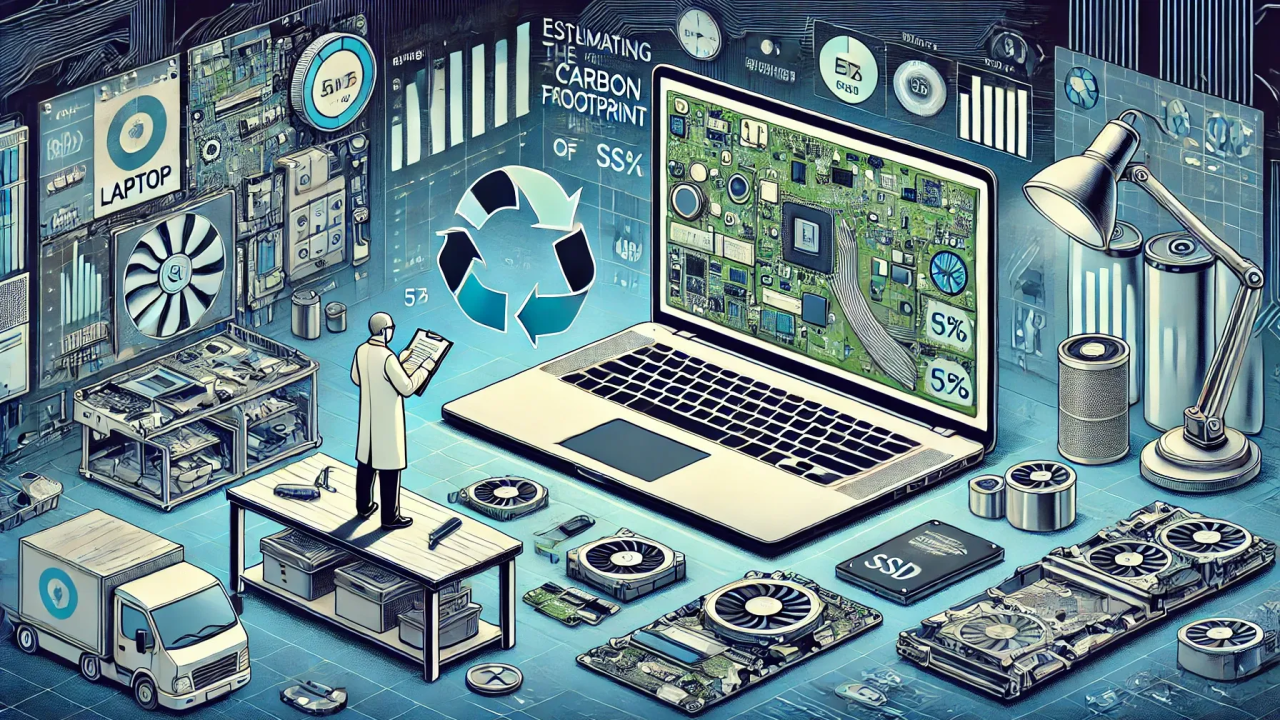I have done this report to highlight the importance of reusing where ever possible
Estimating the Carbon Footprint of Laptop Components and Lifecycle Phases
Recent analyses reveal that manufacturing accounts for 68 85% of a laptop's total carbon footprint, with transportation and usage phases contributing the remainder 1 2 3 . By dissecting emissions across components and lifecycle stages, we can identify hotspots for sustainability improvements.
Manufacturing Phase Breakdown 68 85% of total footprint)
1.LCD Screen: 60-80 kg CO₂e
Display manufacturing is highly energy-intensive due to the precision required for panel production and backlight assembly. Dell's lifecycle assessments show displays account for 30% of manufacturing emissions 3 4 . For a 330 kg baseline:

2.Motherboard: 90 110 kg CO₂e
The motherboard represents the largest manufacturing contributor due to its complex semiconductor fabrication and material extraction (e.g., gold, copper). Dell reports 43% of manufacturing emissions stem from mainboards and associated circuitry

3. SSD Solid-State Drive): 10-15 kg CO₂e
SSD production emits 8×more CO₂e than HDDs due to energy-intensive NAND flash fabrication 6 . While Dellʼs PAIA tool attributes minimal emissions to SSDs in some models 3 , broader analyses suggest SSDs contribute 5-10% of manufacturing emissions
4.Battery: 12-18 kg CO₂e
Lithium-ion battery production involves mining rare metals (e.g., cobalt) and energy-consuming assembly. Batteries account for 6% of manufacturing emissions in Dellʼs assessments

5. Plastic Parts Lid, Base, Palmrest, Trackpad): 15-20 kg CO₂e
Injection-molded plastics like ABS and polycarbonate contribute 7% of manufacturing emissions, primarily from petroleum extraction and molding processes

6. Power Supply: 10-14 kg CO₂e
Power adapters and circuitry add 5% of manufacturing emissions, driven by copper winding and transformer production

Post-Manufacturing Phases
7.Shipping: 30-45 kg CO₂e
Air freight from assembly hubs (e.g., China) to global markets generates 6-12% of total emissions 2 9 . For a 330 kg baseline:

1.Electricity Usage 3 Years): 45-70 kg CO₂e
Assuming 8 hours/day usage:
Energy Consumption: 50 100W/h ≈ 438 876 kWh over 3 years 7 .
Emissions Factor: 0.233 kg CO₂e/kWh UK grid)

Aggregate Carbon Footprint

Strategic Mitigation Opportunities
Extend Lifespan: Doubling a laptopʼs use from 3 to 6 years cuts annual emissions by 47%.
Renewable Energy Adoption: Charging via solar/wind reduces usage-phase emissions by 80% 11.
SSD Optimization: Transitioning to low-power NAND architectures could reduce SSD emissions by 30%.
Sustainable Logistics: Shifting to ocean freight and regional manufacturing hubs slashes shipping emissions by 60%.
This analysis underscores the urgent need for circular design principles and cleaner energy integration across the ICT sector.
⁂
https://networkandsecurity.co.uk/understanding-laptops-carbon-footprint/ https://www.linkedin.com/pulse/how-sustainable-can-laptop-really-ben-ward https://i.dell.com/sites/csdocuments/Corporate_corp-Comm_Documents/en/WP E6430.pdf https://i.dell.com/sites/csdocuments/Corporate_corp-Comm_Documents/en/WP E6530.pdf https://i.dell.com/sites/csdocuments/Corporate_corp-Comm_Documents/en/display-white-paper.pdf https://blocksandfiles.com/2023/08/18/hdds-may-be-greener-than-ssds/ https://ditchcarbon.com/blog/articles/the-carbon-footprint-of-the-top-10-laptops
https://www.powersupplyshop.co.uk/brands/lenovo/laptops/thinkpad-x1-carbon-gen7/adapter-EU 1/ https://recykal.com/blog/how-can-organizations-reduce-their-laptops-carbon-footprint/ https://edwebcontent.ed.ac.uk/sites/default/files/atoms/files/pc-carbonfootprints-jh-ecci2.pdf https://tcocertified.com/news/using-a-notebook-computer-for-three-more-years-can-cut-emissions-in
https://circularcomputing.com/news/remanufactured-laptops-produce-only-6 34-of-co2/ https://circularcomputing.com/news/carbon-footprint-laptop/

